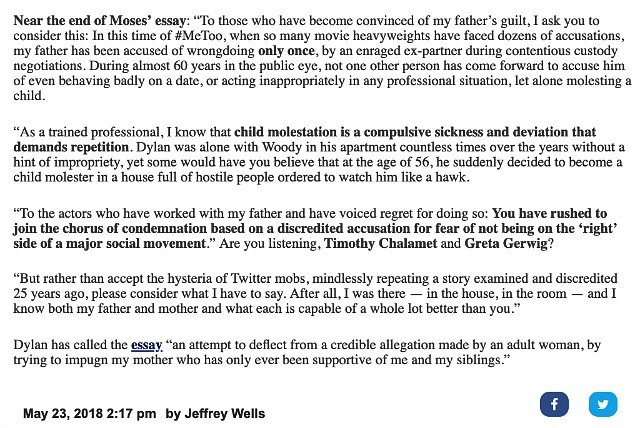No present-tense Oscar contender has quite the character or cojones of Marriage Story‘s Scarlett Johansson. And right now in my mind, there’s no one who’s more of an obsequious, go-along wokester and fact-averse denialist than The Daily Beast‘s Jordan Julian, who posted a piece on 11.27 that denigrated Johansson for speaking her mind about Woody Allen‘s all-but-certain innocence in that dusty, all-but-discarded matter of child molestation.
The headline of Julian’s article was infuriating: “Scarlett Johansson’s Persistent, Baffling Defense of Woody Allen Could Ruin Her Oscar Chances,” followed by a subhead that read “the actress has turned in the best performance of her career in Marriage Story but can’t stop defending the accused sexual predator.”
Three days ago Johansson told Vanity Fair‘s Chris Heath that she’s not backing off from her earlier statement (given to The Hollywood Reporter‘s Rebecca Keegan last September) that she believes Allen is innocent of that 27 year-old, one-time-only charge of child molestation — i.e., she hasn’t changed her mind.


The charge pushed by Dylan Farrow, Allen’s alleged victim, and Allen’s former romantic partner Mia Farrow has been disputed, dissected, exposed and debunked so many times that it’s grown a beard, but the “always believe the victim no matter what” crowd will not back off, and I mean in defiance of every piece of credible evidence that has come to light and despite an absolutely conclusive essay that puts the whole thing to bed, posted on 5.23.18 by Dylan’s older adoptive brother, Moses Farrow.
Johansson to Heath: “Even though there [are] moments where I feel maybe more vulnerable because I’ve spoken my own opinion about something, my own truth and experience about it — and I know that it might be picked apart in some way, people might have a visceral reaction to it — I think it’s dangerous to temper how you represent yourself, because you’re afraid of that kind of response. That, to me, doesn’t seem very progressive at all. That seems scary.”
When Heath asks if “any of the criticisms, when she heard them, made her think that they had a point,”: Johansson replies: “I don’t know…I feel the way I feel about it. It’s my experience. I don’t know any more than any other person knows. I only have a close proximity with Woody…he’s a friend of mine. But I have no other insight other than my relationship with him.”
But she does have an insight that complements her relationship with Allen — an obviously legitimate and first-hand viewpoint from Moses Farrow, a trained therapist who knows all the players and everything that happened, backwards and forwards. He was right there in the Connecticut Farrow home on the day in question. His testimony is undismissable. Except, that is, by obstinate contrarians like Julian.
Here, for the seventh or twelfth or possibly the eighteenth time, is the HE argument:
(1) There is no evidence to support Dylan’s claim. But there’s a fair amount of evidence and ample indications that an enraged Mia Farrow made it all up to “get” Woody during an early ’90s custody battle, and as part of this determination coached Dylan to make the claims that she did. I happen to personally believe this scenario. There’s simply no rational, even-handed way to side with the “I believe Dylan Farrow” camp.
(2) If after reading Moses Farrow’s 5.23.18 essay (“A Son Speaks Out“) as well as Robert Weide’s “Q & A with Dylan Farrow” (12.13.17) and Daphne Merkin’s 9.16.18 Soon-Yi Previn interview…if after reading these personal testimonies along with the Wikipedia summary of the case you’re still an unmitigated Dylan ally…if you haven’t at least concluded there’s a highly significant amount of ambiguity and uncertainty in this whole mishegoss, then I don’t know what to say to you. There’s probably nothing that can be said to you.
(3) Excerpt from Yale–New Haven Hospital Child Sexual Abuse Clinic report (issued in 1993): “It is our expert opinion that Dylan was not sexually abused by Mr. Allen. Further, we believe that Dylan’s statements on videotape and her statements to us during our evaluation do not refer to actual events that occurred to her on August 4th, 1992.
(4) In developing our opinion we considered three hypotheses to explain Dylan’s statements. First, that Dylan’s statements were true and that Mr. Allen had sexually abused her; second, that Dylan’s statements were not true but were made up by an emotionally vulnerable child who was caught up in a disturbed family and who was responding to the stresses in the family; and third, that Dylan was coached or influenced by her mother, Ms. Farrow. While we can conclude that Dylan was not sexually abused, we can not be definite about whether the second formulation by itself or the third formulation by itself is true. We believe that it is more likely that a combination of these two formulations best explains Dylan’s allegations of sexual abuse.”










